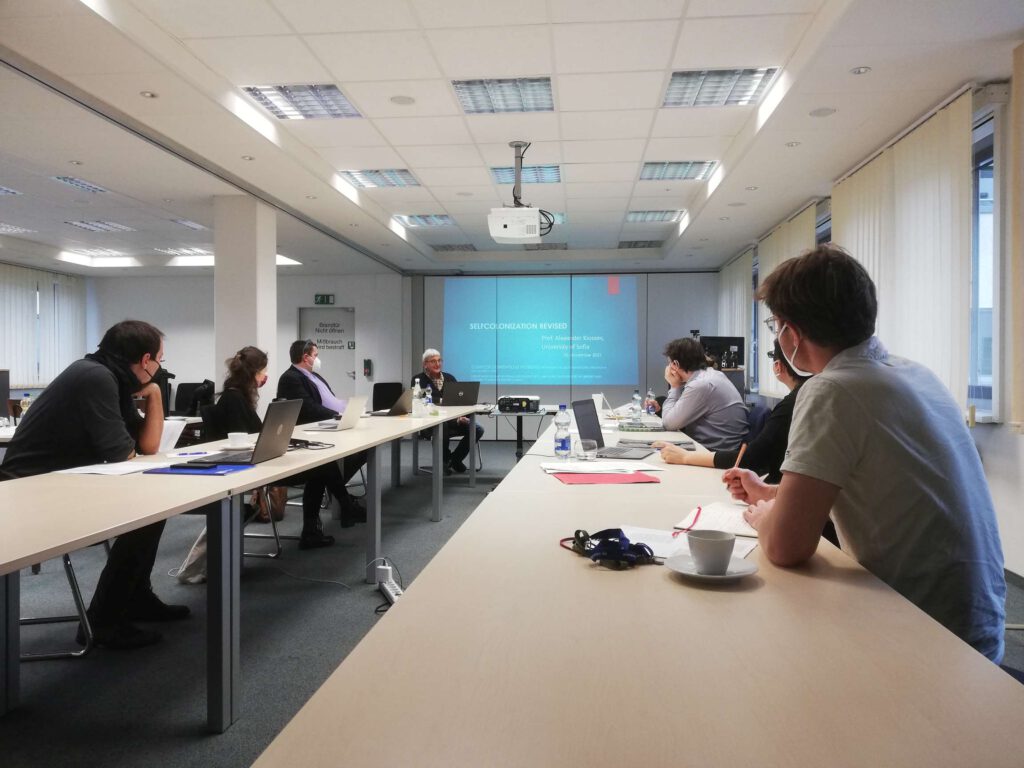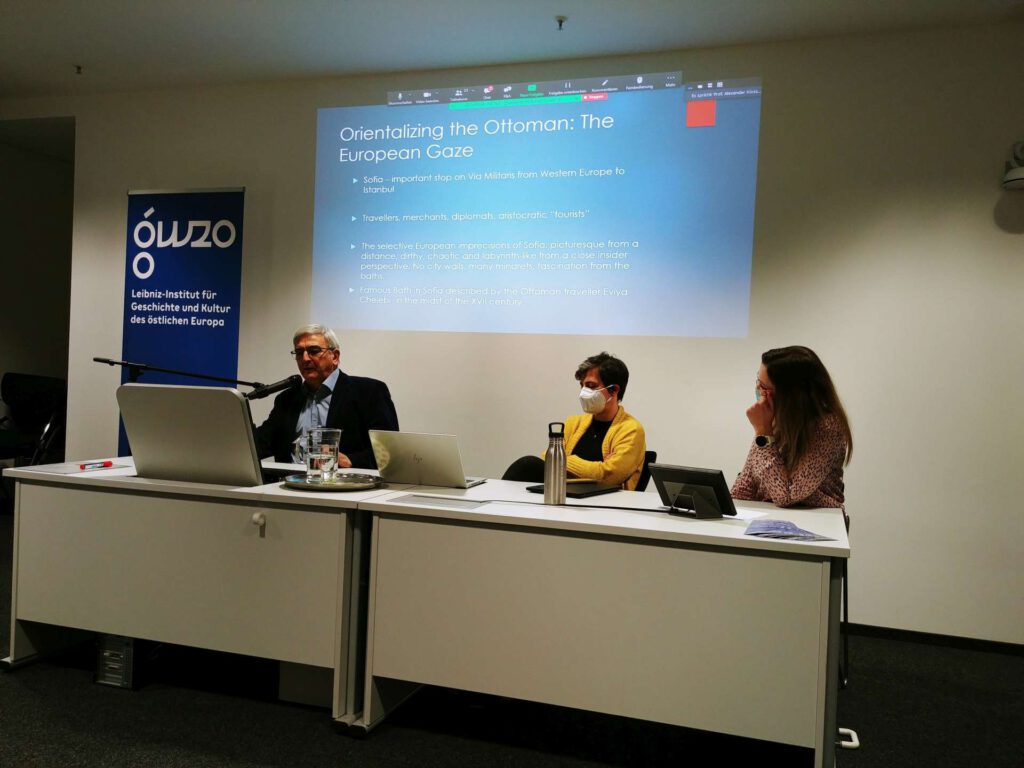
This article by CoMoDe researcher Lyubomir Pozharliev was first published on the ifl.blog. Read the originial article here.
From 28 November to 4 December 2021, the IfL and many research facilities in Leipzig had a very exciting and tense week together with Professor Alexander Kiossev from Sofia University.
He gave a fascinating keynote Lecture at GWZO and an intensive master class at the IfL. The workshop was organised by Lyubomir Pozharliev and Lela Rekhviashvili from the CoMoDe project team, in collaboration with Corinne Geering from GWZO, and was funded by the Leibniz ScienceCampus Eastern Europe – Global Area (EEGA).
Alexander Kiossev is a Professor of History of Modern Culture and a Director of the Cultural Centre of Sofia University. His research interests include problems of reading, the visual culture of the city, cultural history of totalitarianism and transition. He has published four monographs in Bulgarian and has edited a number of collective volumes in English, German, and Bulgarian. Many of his papers have been translated into English, German, French, Dutch, Ukrainian, Czech, Polish, Romanian, Serbian, and Macedonian.
In addition to his keynote lecture and the master class, Prof. Kiossev had multiple meetings with some of the brightest minds working in the city of Leipzig. We have started with Dr. Thilo Lang, head of the department Regional Geography of Europe at the IfL, and continued with several more meetings with Prof. Sebastian Lentz, director of the institute. In the following days, Prof. Kiossev met the Leibniz-Junior Research Group CoMoDe and the head of the project as well as Senior Researcher at the IfL Dr. Wladimir Sgibnev. Furthermore, we had the chance to meet the new director of GWZO Prof. Dr. Maren Röger and had fruitful exchange of opinions with the head of the department Culture and Imagination, Arnold Bartezky. On the next day, Prof. Kiossev was welcomed for a guided tour of the IfL library prepared by Dorothee Zickwolff and finished the day with a tour of IfL archive together with its head, Dr. Bruno Schelhaas. At the end of this busy week Prof. Kiossev had a working meeting with the head of the Department of History from 19th to 21th century at the University of Leipzig and leading scholar in the field of theory of infrastructure, Prof. Dr. Dirk van Laak, followed by another productive meeting with the speaker of Research Area 4 of EEGA ScienceCampus, Dr. Katja Castryck-Naumann.
Prof. Kiossev’s theoretical and analytical interventions throughout various formats of the week-long interdisciplinary methods workshop contributes significantly to ongoing discussions within IfL, GWZO and EEGA. He addressed questions, uncommon for Western academia, such as his most famous self-colonizing metaphor – concept and a method with the capacity to approach multiple problems in the countries of Eastern Europe. In teaching his concept of self-colonization, he also drew the limits of its applicability. The methodological tool called “the self-colonizing metaphor” should be rather applied to countries not directly under colonial control in the course of the 19th and early 20th century, and cannot explain universal problems of all countries in the course of all-time. This adds even more to the concept, because it sets up conditions of applicability, time-period and geographical parameters. It shows that we should be cautious about the limits of our generalizations and our scope of scientific definitions. In the words of Blaise Pascal, all definitions are restrictions.
Following that, Alexander Kiossev reminded us that we should not overstretch boundaries of what we define as colonial, and can rely on alternative terms such as hegemony to understand domination in contexts which don’t involve direct colonization. Not all hegemonic relations should be referred to as colonial or totalitarian, where totalitarian, almost forgotten by contemporary academic discourse, implies pervasiveness of social disciplining power, and does not recognize neither a distance, nor a distinction. The question of distinction and distance are here crucial. They are, according to Alexander Kiossev, the two main features of colonial thinking; spatial distance represented by the metaphor of the „Salt water“, the big blue gap called the oceans, and the cultural-distinctive one – called the civilization, the unwillingness to accept the Other as possible.
This distinction refers to the eschatological dream of the Christian paradise; it represents the longing for the paradise on earth and the longing for Europe. Without the salt-water (distance) and the imagination of the “True world” (distinction) coloniality would seem impossible. On the contrary, Kiossev affirms, “The concept of self-colonizing can be used for cultures having succumbed to the cultural power of Europe and the West without having been invaded and turned into colonies in actual fact.” [1] None of the features of coloniality applies to the majority of the Eastern European countries, but the colonial spirit is there and it is everlasting, far beyond the expectations of the colonial actors themselves.
In line with Bourdieu and his understanding of Habitus, Kiossev positions some of the newly established 19th and 20th century new small national states in Eastern Europe in a peculiar position. Independent, but neither belonging to the Empire of origin, nor with strong enough own powers to recreate itself as an independent entity. This curious and difficult position leads to a point that large parts of the newly constructed past should be erased and new should arise from the ashes.

While presenting us the core of his theory during the master class held at the IfL, at his Keynote lecture at GWZO he gave us an original example of the devastating erasure of the old Ottoman heritage in the newly established capital of the Principality of Bulgaria after 1878. The illuminating clearance of at least 25 mosques and the pretense of recreating the new modern Sofia to a Vienna-alike capital in the public policy of the 1890’s and early 1900’s makes Kiossev’s arguments convincing. And here comes the metaphor of the self-colonization, the prolonging dreaming of the West, without sufficient foundations in its own past, and the missing distance of the Salt sea and the violence related to it. It reminds us of the classics ‘’Imagining the Balkans” by Maria Todorova, and the constructed backwardness and ‘Balkanism’ of the whole peninsula. Yet, without gaining such a global popularity the concept of self-colonization, in-line with her arguments, was published one year prior to it, in 1995.
Thanks to this great conceptual and networking exchange with Professor Alexander Kiossev, the researchers from the IfL and all EEGA member institutions from Leipzig/Halle have a new collaborator from the oldest and most prestigious Bulgarian University – Sofia St. Kliment Ohridski.
